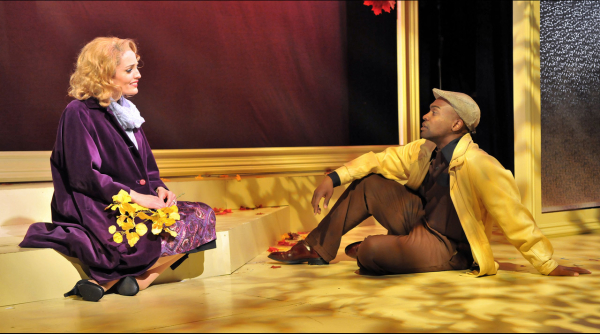
(© Craig Bailey)
The musical Far From Heaven, based on the 2002 film written and directed by Todd Haynes, takes place in mid-'50s, small-town America when Dwight D. Eisenhower was in the White House, and a prosperous nation was exploding out to the suburbs. The look-alike, think-alike culture meant that any socially unacceptable behavior was kept under wraps.
Scott Edmiston directs the SpeakEasy Stage Boston premiere of the musical, now playing at the Boston Center for the Arts. Adapted from the film by Richard Greenberg (book), Scott Frankel (music), and Michael Korie (lyrics), the stage show foreshadows the dualities of the story's ordinary housewife and mother. In a prologue to the overture, all the characters walk onto a dark stage and stand — unconnected — before they launch into the opening song. Sung by the full cast, "Seasons" segues into the anthem, "Autumn in Connecticut," a solo for the blonde, blue-eyed Cathy Whitaker, portrayed by Jennifer Ellis .
Cathy, a naive, protected woman, has carved out a perfect life for herself by satisfying the expectations of family and friends. "Autumn in Connecticut" praises the beauty of nature in her hometown and the predictable rhythms that delight her and mirror her own, but the music soon descends into dissonance when her perfect world begins to crumble. As Cathy’s husband, Frank (played by Jared Troilo), becomes more and more unhappy in their relationship, he resorts to alcohol, physical violence, and secrecy. Cathy turns to her African-American gardener, Raymond Deagan, for comfort. Maurice Emmanuel Parent gives Raymond gravitas and wisdom as he recognizes the problems of their mutual attraction, but he does not exude enough sexuality to make their chemistry believable.
Their discreet meetings soon attract attention and scorn from both the white and black communities in town. By the end, Cathy has only the familiar rhythms of the prison-like suburbs to sustain her.
Ellis is fine as Cathy changes from the sheltered wife to a woman facing a life much different than the white-picket-fence existence she starts with at the beginning. The always excellent Aimee Doherty is cast as her clear-eyed best friend. Kerry Dowling is worth noting as the pompous social reporter, while Will McGarrahan gives the psychiatrist who will help Frank "solve" his problem a welcome sardonic edge.
Much of the angst in this story is delivered by the Frankel-Korie score, which is neither memorable nor innovative enough to fully express the anxiety felt by Cathy, Frank, and Raymond. Edmiston has expanded the scope of the themes beyond the prejudices of the 1950s to a larger (and perhaps more present-day) view. Eric Levenson has designed a series of large and empty frames on a bare stage, symbolizing the boxlike social rules that confine the characters. Charles Schoonmaker's period costumes perfectly complement the set design. However, despite good intentions all around, one might wonder about the initial urge to turn an affecting film into a less than powerful experience onstage.









